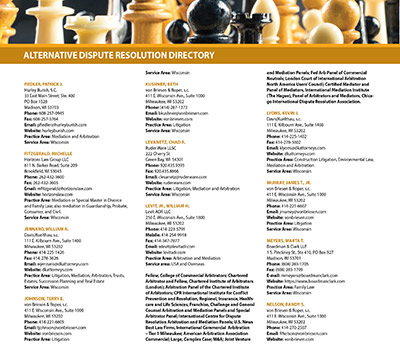Point, counterpoint: Will Mortimore v. Merge Healthcare Inc. have lasting effect on Wisconsin arbitration?
By: WISCONSIN LAW JOURNAL STAFF//December 17, 2012//
Point, counterpoint: Will Mortimore v. Merge Healthcare Inc. have lasting effect on Wisconsin arbitration?
By: WISCONSIN LAW JOURNAL STAFF//December 17, 2012//
In an opinion filed Sept. 18, the Wisconsin Court of Appeals ruled to reverse a decision that an oral employment contract go to trial when it should have gone to arbitration. Does the ruling in Mortimore v. Merge Healthcare Inc. mean Wisconsin favors arbitration? Would a different ruling have damaged Wisconsin’s ability to compete for businesses? The defense attorney in the case, Michael Summerhill of Freeborn & Peters LLP, Chicago, debates the issues at bar with attorney Jeff Hynes, co-chairman of the Wisconsin Employment Lawyers Association.
Point: Decision provides essential clarification of state law
By Michael Summerhill

Mortimore v. Merge Healthcare Inc., 2012 WI App 109, provides essential clarification of Wisconsin state law with respect to the interpretation and application of agreements to arbitrate.
By bringing state law in line with the developing national consensus in this area, the Wisconsin Court of Appeals ensured that employers will continue to view Wisconsin as a predictable and secure forum for the negotiation and execution of employment contracts.
The trial court proceeding stemmed from a 2004 employment agreement between William Mortimore and Merge Healthcare Inc., which provided that any claim “arising out of or relating to” that agreement would be arbitrated and the agreement could not be modified or amended unless such change was made in writing.
Mortimore resigned in 2009 and shortly afterward filed suit in Milwaukee County asserting various claims related to his former employment, including breach of contract. Merge moved to stay certain of these claims pending their arbitration. In response, Mortimore contended that his claims were properly subject to judicial review because the 2004 agreement had been superseded by a 2006 oral employment agreement that did not include an arbitration requirement. Merge replied that Mortimore’s supersession allegation itself was subject to arbitration.
The Milwaukee County Circuit Court denied Merge’s objection to its jurisdiction and held an evidentiary hearing regarding the existence of the 2006 replacement contract. The court ultimately found for Mortimore on this issue, ruling that the parties’ post-2004 negotiations regarding a replacement contract demonstrated that they intended to create — and did create — a new employment agreement, despite the absence of a written document to that effect.
In reversing this decision and remanding the dispute for arbitration, the Wisconsin Court of Appeals found that where an agreement: (a) provides that it may be modified or amended only through writing and (b) contains a broad arbitration clause of the kind present in the 2004 contract, an objection to that agreement’s continued validity based on the alleged existence of a superseding oral agreement is itself subject to arbitration.
It further ruled that the incorporation of the American Arbitration Association Commercial Rules into a contract acts as an adoption of Rule 7(a) of those rules, which provides that the arbitrability of a claim must itself be decided through arbitration.
Mortimore’s holdings are not narrowly limited to its facts. Future litigants may attempt to distinguish the case based on Mortimore’s professional status, the nature of his employment agreement negotiation process or the basis of his claims against Merge. But the decision contains no suggestion that those facts were central to the outcome. At present, the only reasonable reading of Mortimore is one that considers it to apply to the arbitrability of disputes in general.
Both of Mortimore’s holdings constitute first-impression determinations in Wisconsin. Although the appellate court’s decision may appear commonsensical, the outcome of Merge’s appeal was far from a foregone conclusion, as the results in the trial court demonstrate. Merge and Mortimore had engaged in negotiations regarding a replacement for the 2004 agreement and their actions did evidence intent to effect that replacement in the near term. Pre-Mortimore Wisconsin precedent offered some basis for arguing that an enforceable contract may be created without a signature.
The Court of Appeals’ ruling, however, made clear that negotiations, in and of themselves, cannot create an enforceable oral contract. And while most other courts that have considered the question adopted the view that incorporation of the AAA Commercial Arbitration Rules also acts as a specific adoption of AAA Rule 7(a) that allows the arbitrator to determine the arbitrable issue, no Wisconsin court had previously addressed the issue.
The ruling with respect to the AAA Commercial Arbitration Rules will arguably be of practical importance only to the extent that it allows incorporation of those rules to serve as a backstop for drafting oversights with respect to the intent to submit questions regarding arbitrability to the arbitrator.
The court’s ruling on the supersession question, however, has far more significant consequences. It provides employers and employees doing business under Wisconsin law essential assurance that an agreement to arbitrate cannot be easily and opportunistically avoided through mere allegations in a pleading, as Mortimore attempted here.
Had the circuit court’s ruling been permitted to stand, the implications, both for existing Wisconsin employment contracts as well as for any future Wisconsin employment negotiation or agreement, would have been sweeping and severe.
An affirmance by the Court of Appeals would have meant that no agreement to arbitrate, however emphatically worded, could fully guarantee the parties would be spared the inconvenience and expense of judicial process. A party could merely allege the parties had subsequently orally agreed to do away with the requirement to arbitrate.
It also would have had a chilling effect on the negotiation of replacement employment contracts. To the extent a given party valued the right to arbitrate provided under an existing contract, the risk of inadvertently losing that right at some indeterminate point of a subsequent renegotiation could reasonably inhibit that party’s willingness to engage in any reconsideration of the agreement’s terms.
Instead, Mortimore ensured that parties can negotiate and execute employment contracts with confidence that arbitration clauses will be consistently and reliably enforced. In so doing, it made certain that Wisconsin’s competitiveness as a location for business operations would not be burdened — as it well might have been — by substantial new and negative extra-market considerations.
Counterpoint: Narrow holding simply reiterates existing law
By Jeff Hines

Though the Wisconsin Court of Appeals in Mortimore v. Merge Healthcare Inc. cited to a long-standing litany of arbitration cases, its ultimate holding is narrow and fact specific. The case will therefore have little, if any, impact on future cases arising in this area.
In Mortimore, the plaintiff had a 2004 employment contract containing an arbitration clause. He alleged that that contract was superseded by a 2006 oral agreement with his employer that eliminated the arbitration requirement. The circuit court found that the 2006 oral contract superseded the 2004 contact. The appeals court simply held that such determination should have been made by the arbitrator, not the circuit court, and remanded the case to the arbitrator. In other words, the simple holding of the court was that, on the facts presented — i.e., whether the 2006 contract superseded the 2004 contract — the matter was arbitrable.
To assert that such a holding breaks new ground in Wisconsin law or somehow provides a more favorable body of law for employers would require an illusory stretch of logic and ignores the unique context in which the case arose.
In particular, Mortimore involved the circumstance of a high-level executive (the CEO) who presumably negotiated the agreement containing an arbitration clause via an arm’s-length transaction, with the full advice of legal counsel, and obtained substantial compensation and other benefits in exchange for his agreement to arbitrate.
The case also arose in the context of an executive who was apparently asserting straightforward breach-of-contract claims, as opposed to claims under civil rights laws, workplace discrimination laws or other ancillary state and/or federal statutes.
Finally, the executive in Mortimore voluntarily agreed to contract language that expressly provided that all employment disputes were to be arbitrated and that such agreement could not be modified, other than by a written instrument signed by both parties.
The case is, therefore, the perfect boilerplate for a court to enforce an arbitration clause. However, because it fits so squarely within the parameters of existing arbitration case law, it will have virtually no precedential value in future cases that involve different facts. Put another way, this case does nothing more than reiterate well-established law favoring the arbitration of contract disputes where upper-level corporate officers and executives agreed to do so.
Notably, the state Court of Appeals avoided any foray into the more difficult and uncharted territories in this field, where the law is uncertain and ever evolving. For example, there is nothing in the decision that addresses the complex circumstance of a low-level manager or rank-and-file employee who, presumably, does not share an equal bargaining position with the employer; is not represented by counsel; and/or is forced to sign an arbitration agreement in circumstances that involve potential duress, undue influence, fraudulent inducement, inadequate consideration and other factors that call into question the fundamental enforceability of the arbitration clause.
The decision also does not address the cutting-edge question of whether noncontractual disputes, such as claims arising under our state and federal employment discrimination laws, or claims involving alleged violations of constitutional rights in the workplace are, in fact, arbitrable and, if so, under what circumstances and required due process of law. In those cases, the stakes are high, and the parties’ intentions less descript. The courts have, therefore, been more reluctant to submit such matters to the private, backroom discourse of an arbitration proceeding, due to fundamental concerns about fairness, due process and the potential for inadequate remedies.
The Mortimore decision does not even touch upon, let alone address or modify, these evolving and unpredictable areas of employment law. While the court reiterates historic precedent favoring arbitration of employment contract disputes, it provides equal citation to contrary precedent. By way of example, the court acknowledges that contracts containing arbitration clauses carry a “strong presumption of arbitration.” By the same token, the court reaffirms the well-settled rule of law that “no party can be compelled to arbitrate a matter which he or she has not agreed to submit to arbitration,” as well as the principle that “the question of arbitrability is one for judicial determination, unless the parties expressly agree otherwise.”
Thus, even on the issue of arbitrability Mortimore, at most, conveys a potpourri of mixed signals, thereby underscoring the reality that decisions in this area will continue to be governed by a case-by-case analysis.
Again, it is critical to recognize that the scenario presented in the Mortimore case involved a high-level executive who, presumably:
(1) negotiated his original employment agreement, including the arbitration clause, via an arm’s-length transaction and with full advice of legal counsel;
(2) received specific and substantial pay and other consideration in exchange for his promise to arbitrate;
(3) raised “garden-variety” breach of contract claims, as opposed to claims under the civil rights, discrimination or other statutes; and
(4) knowingly agreed to contract language providing that employment contract disputes are to be arbitrated, unless otherwise agreed to in writing.
The above-referenced facts and suppositions made the Mortimore case a straightforward and obvious candidate for arbitration. Any attempt to apply Mortimore to future cases involving different factual scenarios would be the equivalent of trying to place a square peg into a round hole and is, in any event, not supported by the plain language of the court’s decision.
Legal News
- Vice President Harris returning to Wisconsin for third visit this year
- Wisconsin joins Feds, dozens of states to hold airlines accountable for bad behavior
- Trump ahead of Biden in new Marquette poll
- Bankruptcy court approves Milwaukee Marriott Downtown ‘business as usual’ motion
- New Crime Gun Intelligence Center to launch in Chicago
- Arrest warrant proposed for Minocqua Brewing owner who filed Lawsuit against Town of Minocqua
- Wisconsin Supreme Court justices question how much power Legislature should have
- Reinhart named the 2024 Wisconsin law firm of the year by benchmark litigation
- Milwaukee’s Common Council now has the most African Americans, women and openly LGBTQ members ever
- Office of School Safety Provides Behavioral and Threat Assessment Management Training Ahead of 25th Anniversary of Columbine Shooting
- Wisconsin Supreme Court to hear arguments in Democratic governor’s suit against GOP-led Legislature
- Lawsuit asks Wisconsin Supreme Court to strike down governor’s 400-year veto
WLJ People
- Power 30 Personal Injury Attorneys – Russell Nicolet
- Power 30 Personal Injury Attorneys – Benjamin Nicolet
- Power 30 Personal Injury Attorneys – Dustin T. Woehl
- Power 30 Personal Injury Attorneys – Katherine Metzger
- Power 30 Personal Injury Attorneys – Joseph Ryan
- Power 30 Personal Injury Attorneys – James M. Ryan
- Power 30 Personal Injury Attorneys – Dana Wachs
- Power 30 Personal Injury Attorneys – Mark L. Thomsen
- Power 30 Personal Injury Attorneys – Matthew Lein
- Power 30 Personal Injury Attorneys – Jeffrey A. Pitman
- Power 30 Personal Injury Attorneys – William Pemberton
- Power 30 Personal Injury Attorneys – Howard S. Sicula










